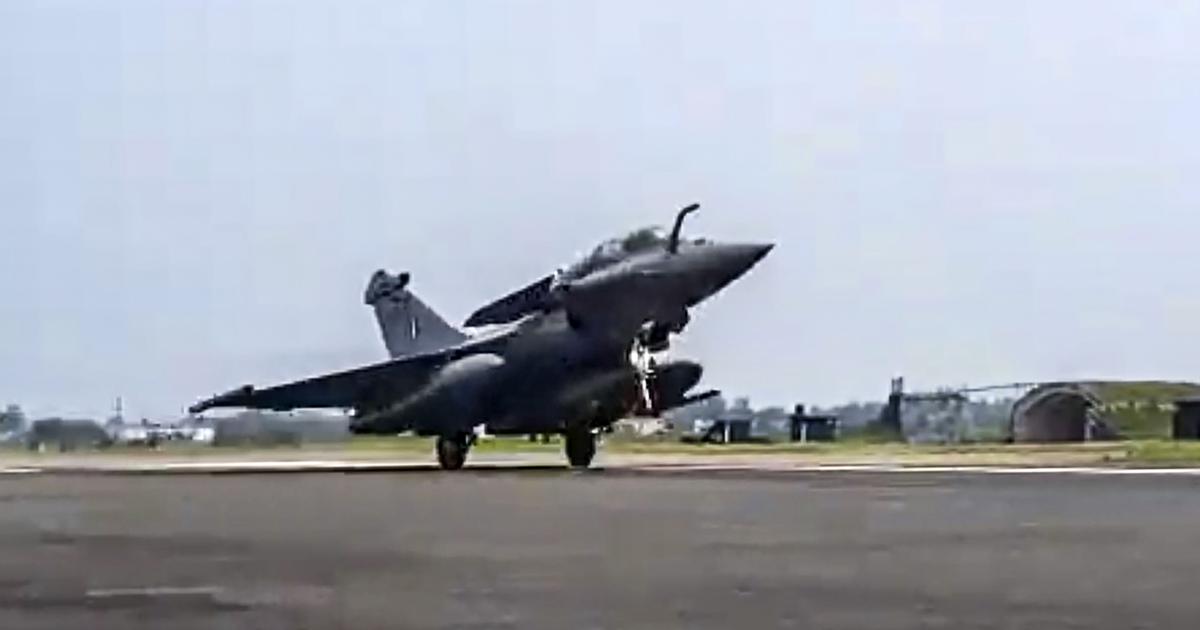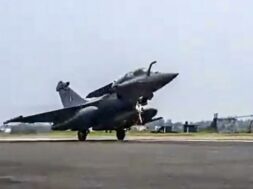
Manas Dasgupta
NEW DELHI, Nov 8: A French journal presenting documentary evidences has claimed that heavy kickbacks were indeed paid by the French plane-maker Dassault to an Indian middleman for the supply of 36 Rafale fighter jets to India at a cost of Rs 59,000 crores and the Central agencies despite having proof of the illegal deal decided against conducting an investigation into the allegations.
The French webportal MediaPart published the report that Dassault paid at least 7.5 million Euros (about Rs 65 crores) to an Indian middleman Sushen Gupta through his Mauritius-based shell company Intersteller Technologies for finalizing the Rafale deal. The Central Bureau of Investigation and the Enforcement Directorate had received documentary evidences of the illegal gratification from the Mauritius government within a week of receiving a complaint to this effect but decided against opening an investigation into the complaint way back in 2018, the report claimed.
The report published by MediaPart, which had been investigating into the Rafale deal on its own, alleged that false invoices were generated to enable Dassault to pay secret commissions to alleged middleman Sushen Gupta, who was also believed to be the middleman in the AgustaWestland VVIP helicopter deal. “Despite the existence of these documents, the Indian federal police has decided not to pursue the affair and has not begun an investigation,” the portal says.
According to its report, the CBI and the Enforcement Directorate have had proof since October 2018 that Dassault paid kickbacks to Sushen Gupta to secure the sale of Rafale jets. The evidence, says the report, is present in confidential documents that surfaced in another corruption case being investigated by the two agencies – the scandal involving the supply of VVIP choppers by AgustaWestland.
The Mauritian authorities agreed to send documents related to the company to the CBI and Enforcement Directorate, to facilitate investigations. The documents were sent to the CBI on October 11, 2018, just a week after the agency received an official complaint alleging corruption in the Rafale deal. “However, the CBI decided not to open an investigation, even though just seven days after that corruption complaint was filed it received information proving that secret commissions had indeed been paid,” MediaPart said.
According to the MediaPart report, the bulk of the alleged payments were made before 2013. MediaPart’s investigation on “Rafale papers” triggered a judicial investigation in France in July into allegations of corruption, influence peddling and favouritism.
According to the portal, this is when they discovered that Sushen Gupta also acted as an intermediary for Dassault over the Rafale deal. The report says Gupta’s Interstellar Technologies “received at least 7.5 million euros from the French aviation firm between 2007 and 2012, thanks to IT contracts that were clearly overbilled, and from which most of the money was discreetly sent to Mauritius using a system of alleged false invoices. Some of these invoices even got the name of the French company wrong, referring to “Dassult” Aviation.
MediaPart said the Mauritian documents cover the period of the bid process that was eventually won by Dassault (2007 – 2012), when the Congress was in power. “Whereas the complaint filed on October 4, 2018, targets suspicious activity that took place from 2015, when the deal was being finalised on the authority of the current BJP Prime Minister Narendra Modi,” it said.
The invoices and bank statements obtained by the CBI show that Sushen Gupta’s shell company received 914,488 euros between 2002 and 2006. Dassault and the alleged middleman soon set up a new and even more opaque financial route to channel payments. The aviation company started buying overbilled IT services through the Singapore-based company Interdev, which was portrayed as the “system integrator for Dassault in Asia”, says MediaPart, adding that it was simply a shell company without any real activity, and was managed by a front man for the Gupta family, currently believed to be in South Africa.
In one document obtained by the Enforcement Directorate, Sushen Gupta suggested that he had handed over money to some officials on Dassault’s behalf. “The risk is taken, you have an agent we have paid, now make sure it is legal clean and defendable. […] No money no decisions […] People sitting in office asking for money. […] Those people will, if we don’t pay, put us in Jail,” the middleman wrote in the September 2012 note, according to MediaPart.
Other documents received by the CBI and Enforcement Directorate show that in 2015, during the final negotiations of the Rafale contract, Sushen Gupta got hold of confidential documents from the Defence Ministry detailing the stance of the Indian negotiators, especially how they calculated the price of the aircraft. Dassault has refused to comment on these documents, the report said.
Five months ago, MediaPart reported that a French judge was appointed to head a probe into suspected “corruption and favouritism” in the deal. In a report in April 2021, the online journal claimed that it was in possession of documents that showed Dassault and its industrial partner Thales, a defence electronics firm, paid “middleman” Gupta several million euros in “secret commissions” in connection with the deal.
According to the April report, the bulk of the payments were made before 2013. “According to an accounts spreadsheet belonging to Sushen Gupta, an entity called simply ‘D’, which is a code he regularly used to designate Dassault, paid €14.6 million to Interdev in Singapore over the period 2004-2013,” the report said.
In another report in April, MediaPart had claimed that Dassault paid €1 million to Gupta for manufacturing 50 large replica models of Rafale jets, even though the planemaker could not provide to the inspectors of French anti-corruption agency any proof that these models were ever manufactured.
India’s decision to sign an $8.7 billion government-to-government deal with France to buy 36 Rafale warplanes made by Dassault was announced in April 2015, with an agreement signed a little over a year later. This replaced the previous Congress-led United Progressive Alliance (UPA) government’s decision to buy 126 Rafale aircraft, 108 of which were to be made in India by the state-owned Hindustan Aeronautics Ltd (HAL).
The deal became controversial. The Opposition, led by the Congress, claimed that the price at which India was buying Rafale aircraft now is ₹1,670 crores for each, three times the initial bid of ₹526 crores by the company when the UPA was trying to buy the aircraft. It also claimed the previous deal included a technology transfer agreement with HAL.
The UPA deal, struck in 2012, was not a viable one, the then defence minister Manohar Parrikar maintained, implying that it would have never been closed and that, therefore, any comparison is moot. The UPA was not able to close the deal till 2014, largely over discussions related to the pricing of items not included in the initial bid. The government has said it cannot disclose the details of the price because of a confidentiality agreement with France, and the strategic reason of not showing its hand to India’s enemies. It said the current deal also included customised weaponry.
The Supreme Court heard a public interest case on the deal and in November 2019, said it saw nothing wrong in it. In a February 2019 report, the government’s auditor, the Comptroller and Auditor General of India has also claimed that India had not overpaid for the jets.













